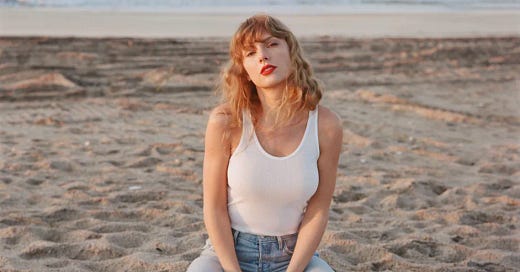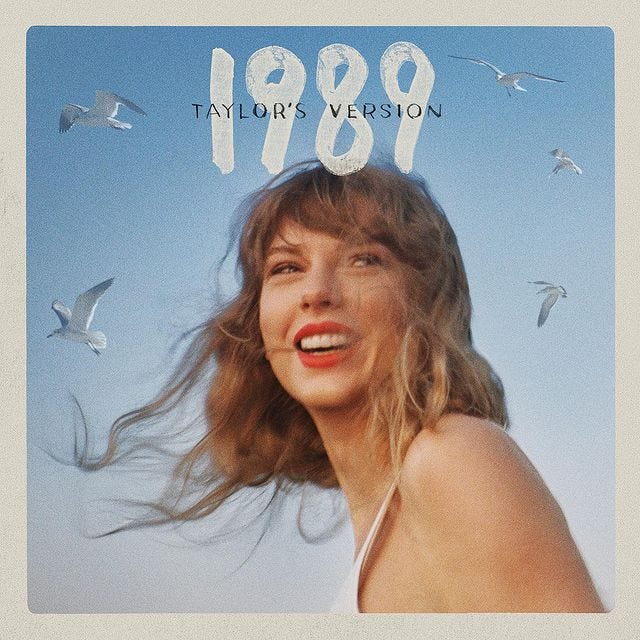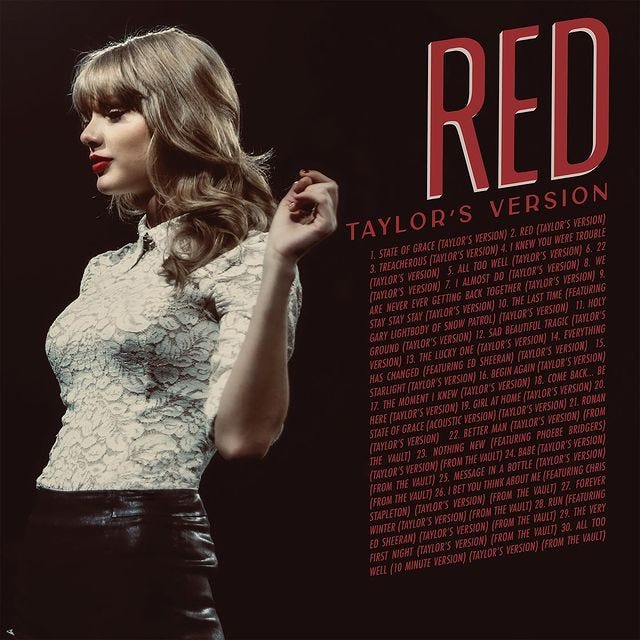(taylor's version) and the power of words
on taylor swift’s greatest copywriting lessons, the fear of writing for commercial success and why we should be taking the business of words seriously.
There are several headlines from the past week that might have increased your awareness of a certain woman called Taylor Alison Swift. Maybe it was the news that she just became a billionaire. Maybe it was the ongoing publicity of her new relationship with Kansas City Chiefs American football player, Travis Kelce. Or maybe, it was the insane buzz around her latest release of her re-recorded 2014 album, 1989, with the new name of 1989 (Taylor’s Version).
I remember my introduction to Taylor Swift like it was yesterday. It was the summer of 2008 and I was 14. My secondary school boyfriend had just broken up with me over the phone (I’m still not over it) via the landline at my parents’ house, days before I was due to head off on our family summer holiday. I was distraught and humiliated and for the next two weeks, I had a lot to process. Late one night, my cousin Abi and I were sat at the edge of the campsite’s swimming pool with our new friend Jess, a girl our age who was on her family holiday too. After a few shy exchanges around the pool a few days earlier, the three of us had become inseparable. Our holiday friendship progressed and we talked about school. We talked about friends. We talked about boys. We talked about films. We talked about music. And then Jess talked about Taylor Swift. ‘Who’s that?’ Abi and I asked (apparently, it took Taylor a little longer to get round to conquering the South Wales music scene). Jess looked shocked. She got out her Sony Ericsson Walkman and played us ‘Teardrops On My Guitar’ on her phone. If ever I needed a pining breakup anthem from the perspective of another heartbroken teenage girl, this was the moment. And from that moment on, I was a Swiftie.
WHAT’S ALL THIS (TAYLOR’S VERSION) STUFF ABOUT, ANYWAY?
Taylor Swift has been releasing music since 2006, after being discovered at the Bluebird Café in Nashville, Tennessee. From 2006 to 2017, she released six studio albums with the record label Big Machine: Taylor Swift (2006), Fearless (2008), Speak Now (2010), Red (2012), 1989 (2014), and Reputation (2017). In 2018, she left Big Machine and signed with Republic Records, with whom she has released four studio albums: Lover (2019), Folklore and Evermore (2020) and Midnights (2022). And since 2021, she has also released four re-recorded albums as part of the Taylor’s Version series, following a dispute with Big Machine.
The dispute officially became public knowledge in 2019 when the news broke that Swift’s old record label, Big Machine Records, had been sold to Scooter Braun – the big music executive known for managing the careers of Justin Bieber, Kanye West, Ariana Grande, Demi Lovato among many other artists. With this sale came the news that Braun now owned all the rights to the master recordings for all of Taylor Swift’s music that was released before her 2019 album, Lover.
Braun’s ‘ownership’ of these masters meant that if anyone wanted to license one of Swift’s old songs to be played in a TV show, film or an advert – they’d have to ask for Braun’s permission and pay Braun the licensing fee. After apparently only finding out that this sale had taken place at the same time as the rest of the world did, Swift took to her Tumblr to write an emotional post on her Tumblr, concluding that ‘you deserve to own the art you make.’ And yet, here she was, with her music now in the hands of a man who had no part in creating it.
And so, Taylor Swift, always the outsmarter and never the outsmartee, set out to re-record everything that existed in the songbook that he now owned, meaning that she would own the copyright to all the new recordings. This would give licensers the ability to still work with Taylor Swift and her team, instead of Braun, when wanting to use her music. And because when switching to Republic Records in 2018 she negotiated to own the masters to all music she created going forward, this re-recording move would also mean that she could reclaim her ownership of her music and how it was used – meaning that all her music would be out in the world on her own terms.
Since then, she has released Fearless (Taylor’s Version) (April 2021), Red (Taylor’s Version) (November 2021), Speak Now (Taylor’s Version) (July 2023) and as of this week, 1989 (Taylor’s Version). Each album has reached number one in the charts of Australia, Canada, Ireland, New Zealand, the UK and the United States, with each one performing better than the last. With this new Taylor’s Version series, Swift has essentially devalued Braun’s investment and educated an entire generation of musicians on the importance of negotiating to own your own masters (though apparently, labels are now trying to stop acts from re-recording their albums like Taylor Swift, with up to 30 year re-record clauses appearing in contracts) – and has also just become a billionaire in the process, too. A mastermind.
TWO WORDS, ONE IMPACT
Over the last 17 years, Taylor Swift’s music has being defined by great songs, her ability to transcend genres and great writing. Her lyrics are loved and obsessed over by so many, to the point where there’s actually a course at Stanford University called All Too Well (10 Week Version), which offers an in-depth analysis of her hit song, All Too Well (10 Minute Version) (Taylor’s Version) – which was released on the Red (Taylor’s Version) album. Oh, and there’s also a course at Ghent University in Belgium called Literature: Taylor's Version, which analyses how her themes, imagery and use of language compares with that of writers like Sylvia Plath, Charles Dickens, Margaret Atwood and Simon Armitage. As writers go, she’s now officially up there with the greats, it would seem.
Across all her music, her words speak directly to her audience to make them feel like instead of singing at you or to you – she’s actually singing with you. She chooses words that tell stories that we’ve all been a character in – delving into her own memories of relatable hurdles and heartaches which, to her fans, feels like she’s reached into your own memories and is now sharing your stories with you.
But for my long-standing obsession with Taylor Swift’s mastery of language in her lyrics, there’s another use of words she’s mastered that has floored me more.
For every album that’s part of the Taylor’s Version series, every song is too. Every track on every album keeps its original title, with one difference: the title is followed by two words (Taylor’s Version). And I honestly believe that it’s the genius of these two words that has made this re-recording such an insanely successful project.
Here’s the thing. In declaring every one of these albums, and every one of these songs, to be (Taylor’s Version), Taylor Swift has implied that any other song of the same title is not hers, but someone else’s.
Swifties will obviously know of the Scooter Braun beef, and there’s no fanbase as devoted and as loyal as the Swifties. By choosing those two words, and repeating them again and again and again, Taylor Swift has sent a very clear message out into the world. It’s almost a battle cry – and it’s one that her entire fandom have answered, and have descended into a mad frenzy to support.
In suggesting that all the previous recordings of her songs were never actually hers, she has created what feels like a moral issue for the Swiftie fandom to fight for. And with just two words, she’s asked a big question: why on earth would Swifties want to own, listen to or return to a catalogue of music that’s been so tainted by deceit and greed, when there are now these all these glittering new versions that are truly hers? Now, parting with hard-earned money for these new albums feels more like a donation than a purchase. It is, quite simply: genius copywriting.
COPYWRITING 101 (TAYLOR’S VERSION)
So really, we all have to conclude that Taylor Swift is actually the world’s greatest copywriter. But it’s not just based on these two genius words alone.
Taylor Swift knows exactly who her audience is. She listens to her fans. She inhales their insights. She knows her audience. She writes with that audience in mind and speaks directly to them. She rhymes. She uses everyday words. She plays with both predictable and unexpected rhythms. She uses the active voice. She tells stories. She leans on literary devices and tweaks them so that they nearly feel like something you’ve heard before – which in turn, makes you remember them.
To be a copywriter is to be a person who spends their days obsessing over choosing the right words that can say the right thing for the right person. And good copy shouldn’t feel like it’s trying to sell you something – it should feel like an invitation into a conversation that you’re already part of (or are desperate to be). It should entertain you. It should inspire you. It should educate you. It should intrigue you. It should resonate with you. Only then, if you feel any of those things, might you feel inclined to buy something, listen to something or donate to something. People don’t just do things because they’re told to (though, I sometimes wish they would) – there’s got to be something that compels them to do it.
For Taylor Swift, the thing that compels people is… her. Alongside her fanbase’s devotion to her great songs and storytelling, her career has also been defined by her highly publicised dating life, a very public feud with Kanye West and relentless press coverage. At her Grammy Museum performance in 2016, Swift herself revealed that she wrote Blank Space in response to the media’s ‘wonderful fixation’ on painting her as a ‘psycho serial dater girl’. It’s safe to say that people everywhere, not just Swifties, have been fascinated in her for years.
Nowadays, Swift leans into this global, cultural obsession with her and uses it to her advantage. She’s often described as a ‘PR Mastermind’, but there was once a time where she wasn’t able to control the narrative like she seems to now. But with a careful combination of authenticity, community and clever, creative marketing and PR strategies, she uses her words and ideas to not only be an absolutely genius artist, but an absolutely genius businesswoman.
To many artists, the world of business feels fundamentally gross and there are many writers who fear the commercial world of copywriting. To be a writer is to be an artist and a master of a craft – but when you’re using those words you’re mastering to make someone else money, this can feel like the opposite of art. Surely to be considered an artist, you should be a penniless writer? A depressed painter? A struggling musician?
At a party a few years ago, I was talking to a musician. Through our conversation, I revealed that I was then working as a copywriter at an advertising agency. He practically laughed in my face in disgust, then launched into a speech about how marketing and advertising was an evil that existed to manipulate people into filling their lives with unnecessary, useless products. I wouldn’t go as far as saying that this guy and I have bad blood, but I have often wondered how if he had leaned on marketing and advertising a little more, he might be now be selling albums and tickets to tours instead of still living at home with his parents in this thirties.
But I digress. Regardless of whether those words you’re mastering are being written for a song, a book, a newspaper, an ad or a brand – you’ve used those words of yours to create something for people to connect with and be entertained by. And the thing about art is that it’s about connection and entertainment – and people will always pay to be entertained. As they should. And while Taylor Swift says, ‘you deserve to own the art you make’, I’d also add that you also deserve to be paid for the art you make – and you should be paid well for it, too.
Taylor Swift became a billionaire at some point over the past few weeks, thanks to a career spent combination of her art, marketing strategy and savvy business decisions. She is proof that, as Cindy Gallop says, ‘there is a tremendous amount of money to be made from taking women seriously.’ And if Taylor Swift is also taking the business of her words seriously, maybe you should be too.
PS. If anyone knows of any tickets going spare for her Cardiff date, I would love to spend the week before my wedding losing my voice screaming all her words.









This is amazing! I've created a Spotify playlist for The Writer's Walk – do you fancy recommending a Taylor Swift song to add to it?
“I wouldn’t go as far as saying that this guy and I have bad blood” -- I see what you did there 😎